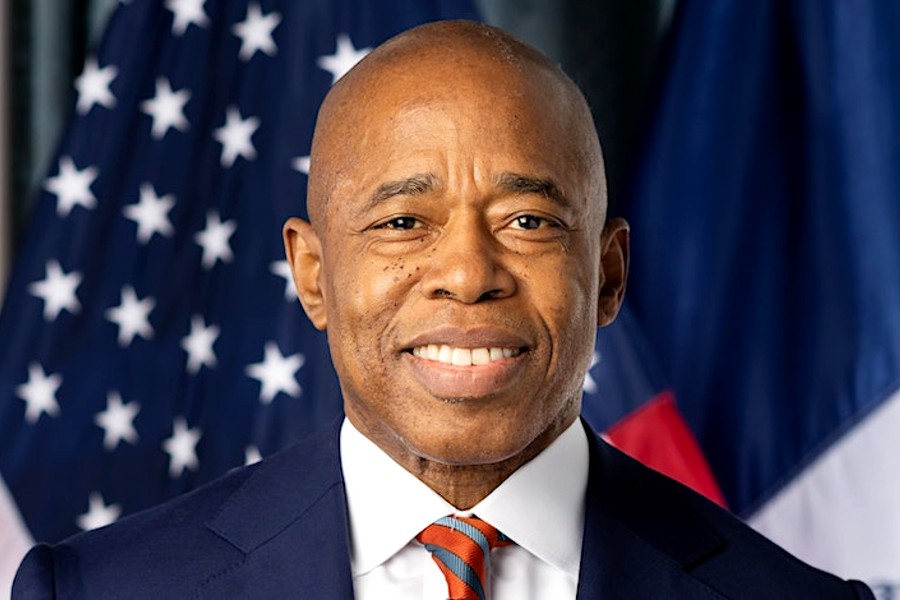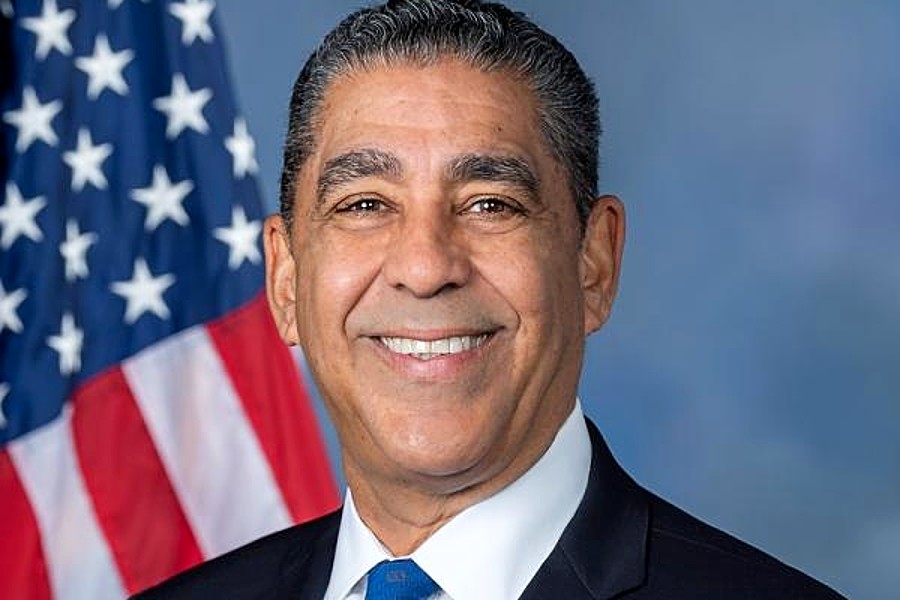 Department of Consumer Affairs (DCA) Commissioner Lorelei Salas today announced the release “Advances and Setbacks in Turbulent Times: Second Annual Report on the State of Workers’ Rights in NYC” from its Office of Labor Policy & Standards (OLPS). The release follows Mayor de Blasio’s State of the City announcement that DCA will be renamed as the Department of Consumer and Worker Protection to reflect the Agency’s expanded mandate, and as OLPS completes its second full year of work implementing vital new protections for workers in New York City and taking on the critical challenges that workers face. DCA released the report in conjunction with a day of outreach to day laborers in the South Bronx as part of City Hall in Your Borough: Bronx.
Department of Consumer Affairs (DCA) Commissioner Lorelei Salas today announced the release “Advances and Setbacks in Turbulent Times: Second Annual Report on the State of Workers’ Rights in NYC” from its Office of Labor Policy & Standards (OLPS). The release follows Mayor de Blasio’s State of the City announcement that DCA will be renamed as the Department of Consumer and Worker Protection to reflect the Agency’s expanded mandate, and as OLPS completes its second full year of work implementing vital new protections for workers in New York City and taking on the critical challenges that workers face. DCA released the report in conjunction with a day of outreach to day laborers in the South Bronx as part of City Hall in Your Borough: Bronx.
Synthesizing testimony from dozens of workers and advocates at DCA’s July 2018 hearing on the State of Workers’ Rights in NYC, the report highlights voids in labor protections experienced by workers across the city, concrete and positive impacts that the City’s workplace laws are having on worker’s jobs and lives, and the strategies DCA deployed in 2018 to make critical progress.
“In 2018, OLPS specifically focused on three critical strategies to address the serious problems that workers – immigrant and low-wage workers in particular – face in today’s economy,” said DCA Commissioner Lorelei Salas. “By adapting our enforcement model to tackle key deterrents that workers face in asserting their rights like retaliation; implementing critical new NYC standards that fill gaps in existing state and federal law, and focusing efforts on raising the standards for paid care workers who have been historically excluded from core labor protections and policy-making, we sought to maximize the impact and effectiveness of our tools as a municipal labor standards agency—and I am gratified to share our results. The testimony we heard from workers and the ongoing feedback we receive in our intensive outreach, education and enforcement work, validated our strategies, and is vital for shaping how we determine our priorities and deploy our resources going forward.”
“This report highlights very real challenges and fears that people working across multiple industries face, and how the City can better address them,” said Carmelyn P. Malalis, Commissioner and Chair of the NYC Commission on Human Rights. “We commend DCA for being a resource to all workers, especially the most vulnerable, and we will continue to work in collaboration with DCA to ensure that workers have access to City resources and know their rights. All New Yorkers deserve to feel safe from bias and harassment at work, based on gender, immigration status, national origin, and race, among other protected categories.”
“The de Blasio administration is laser focused on getting workers more jobs, better pay, and stronger worker protections, regardless of immigration status,” said Bitta Mostofi, Commissioner of the Mayor’s Office of Immigrant Affairs. “This report speaks to what we hear in immigrant communities throughout the city – that immigrant workers face additional unique challenges, including harassment, discrimination, and wage theft. MOIA’s partnerships with DCA and CCHR on informing immigrant workers of their rights in this city, including through worker and employer-focused ‘Know Your Rights’ workshops, have been critical in making New York City the fairest big city in the country.”
“Professional drivers are a critical part of New York City’s labor force who provide for tens of thousands of families, yet they are particularly vulnerable since they frequently work as independent contractors. The TLC recently approved driver pay protections, effective Feb. 1, that will give large app drivers a raise of almost $10,000 a year and allow them to take home the equivalent of the minimum wage,” said Taxi & Limousine Commission (TLC) Commissioner Meera Joshi. “Our Driver Protection Unit also does critical work protecting drivers who are overcharged or not paid, as well as recovering money in restitution and connecting drivers to financial planning resources.”
Key takeaways from the report include:
- Immigrant workers face unique challenges in asserting their rights: At the hearing, more than half of the speakers testified about the extraordinary impact of labor violations on immigrant workers and the obstacles they face when they attempt to assert their rights. This included instances where immigrants faced exploitation at the hands of their employers -including working more than 80 hours a week while receiving less than minimum wage, threats of termination, deportation, legal action, and denial of wages. Workers also discussed recurring themes including absence of legal status, language barriers, and an increase in anti-immigrant rhetoric. Workers also referenced the resulting emotional and psychological harms associated with insecure work, inadequate protection of rights, and insufficient bargaining power against employers.
- Workers have grave concerns about their health and safety, especially those employed in the construction and nail salon industries: Testimony provided at the hearing shows workers in certain industries have strong concerns for their health and safety and indicates that certain dangers could be mitigated or eradicated altogether with stronger standards and consistent enforcement. One construction worker testified that while some workers have trainings and know what they should and should not do, they are sometimes forced to engage in dangerous practices at worksites. Additionally, a nail salon employee testified about the multiple ways that workers are exposed to chemicals – including through ingestion, inhalation, and skin absorption – and push back from employers regarding new ventilation standards.
- Wage theft is a prevalent issue: Worker testimony revealed that some workers are at greater risk of wage theft than others. For example, complex rules governing how tipped workers get paid affects workers who rely on tips for a portion of their income. Many workers and advocates stressed that the confusing tipped wage system facilitates wage theft by giving employers opportunities to appropriate tips before they reach employees and by making it harder for workers to keep track of how much pay they are actually owed. Studies show these workforces tend to be made up of women, immigrants, and people of color. One domestic worker who is also a worker organizer and advocate testified that domestic workers and nannies can work 50 to 100 hours per week with no overtime pay. In addition, two nail salon workers who are also advocates testified that many nail salon workers do not earn minimum wage, are not paid overtime, and do not receive meal breaks. Two models who are also advocates also testified about several incidents where they received late payments from modeling agencies, and at times the agencies failed to compensate them at all for their work. Another participant who is a construction workers and member leader of a local union stressed employers in the industry fail to pay the “prevailing wage,” which requires workers on public sector contract jobs to receive elevated compensation.
- Workers face obstacles accessing information about, and exercising their rights under, NYC’s new labor laws: The de Blasio administration has pursued several new measures to ensure higher labor standards in the past few years – including the enactment of Paid Safe and Sick Leave, the Freelance Isn’t Free Act and Fair Workweek Law. During the hearing, workers testified that despite significant advances in labor protection, gaps such as lack of awareness about rights and employers’ retaliatory threats remain and deter workers from exercising their rights. Some speakers also indicated their employers remained noncompliant, and that some low-income and part-time workers do not seek out their benefits or assert their rights out of fear of termination. One home care worker testified about her experience working for more than 80 hours a week while receiving less than minimum wage with no benefits, while a model testified that agencies sometimes threaten models by refusing to release them from their contracts.
“We commend DCA for the proactive approach it takes to enforcement of critical labor standards by engaging the most vulnerable communities. For low-wage workers already struggling to make ends meet, the rampant wage and hour violations that occur in the service industry are a second blow to the hard-working cleaners, airport workers, security officers and other who keep our cities running,” said Hector Figueroa, President of 32BJ SEIU.
“We are thankful for the opportunity to be a part of this very important report led by the City’s newly named Department of Consumer and Worker Protection. Adhikaar serves and organizes Nepali-speaking, working-class people and families—our members are domestic workers, nail salon workers, restaurant workers, gas station workers and taxi drivers. They are immigrants, many of them on temporary protected status, which is set to be eliminated by the Trump administration on June 24 with no current legislative or litigative solution to protect them. The city is in a unique situation to be the at the frontline of defense for immigrant workers and should take the recommendations laid out in this report as a clear directive to truly build a stronger, healthier and more just workforce for New York City,” said Pabitra Benjamin, Executive Director of Adhikaar.
“Local food production is New York City’s largest manufacturing sector and helps make NYC the culinary capital of the world,” said Daniel Gross, founder and executive director of Brandworkers. “Despite their immense contribution to the city’s communities and economy, the workers of color who feed New York, mostly immigrants, have been highly marginalized in dangerous food factories with painfully low wages. Brandworkers is building an industry-wide organization of local food manufacturing workers to ensure that every job in the sector is a dignified job, especially for the people of color, women, and immigrants who bear the brunt of the abuse. We are thrilled to have such a principled, responsive, and creative partner for this endeavor in OLPS and Commissioner Lorelei Salas. With such extreme hostility to immigrant families in this presidential administration, we look forward to further collaboration with OLPS to achieve immigrant safety in workplaces across New York.”
“DCA paints a very clear picture that despite hard-fought protections, workers continue to face abuse and harassment every day in New York City,” said Ben Fuller-Googins, Programming and Planning Director, Carroll Gardens Association. “This is a reality for many nannies and housecleaners in Carroll Gardens, where wage theft, not getting overtime or paid sick time, and sexual harassment are commonplace despite the New York State Domestic Worker Bill of Rights. Amidst these conditions, we are hopeful in seeing the Department’s commitment to generating creative enforcement mechanisms and look forward to continued work together.”
“With the expansion of paid safe and sick leave, laws to combat unpredictable scheduling, and now a proposal for paid personal time, the de Blasio administration has been leading the nation in expanding workers’ rights,” said Nancy Rankin, Vice President for Policy Research and Advocacy at Community Service Society, an organization that advances upward mobility for low-income New Yorkers. “But passing these laws is just the start. DCA Commissioner Lorelei Salas and Liz Vladeck, head of their Office of Labor Policy & Standards have followed implementation with the persistent monitoring, outreach and enforcement needed to make sure these laws actually benefit the workers they were designed to help, especially the most vulnerable low-wage and immigrant workers.”
“At a time when inequality of income, wealth, power and opportunity are at dangerous proportions, The Worker Institute is pleased to partner with the newly renamed Department of Consumer and Worker Protection to advance worker’s rights and strengthen the collective voice of workers,” said KC Wagner, Co-Chair, Equity at Work, The Worker Institute at Cornell and Lara Skinner, Executive Director, The Worker Institute at Cornell. “DCA’s annual ‘State of Workers’ Rights in NYC’ report shows that workers in New York are increasingly confronted by the expansion of low-wage, precarious and non-standard employment conditions. But New York City has taken important steps in the last year to protect and expand workers’ rights through innovative outreach, education and enforcement efforts, especially for low-wage, immigrant workers. We look forward to continuing to partner with DCA (or DCWP) to provide innovative research, education and training programs to help create a more fair, equitable sustainable workplace and society.”
“Discrimination, wage theft, and harassment are some of the issues that immigrant workers—especially those who are undocumented—face every day,” said Favio Ramirez-Caminatti, Executive Director of El Centro del Inmigrante. “It happens nationwide, but everyone needs to know that it’s unacceptable in our city. DCA has done remarkable work going directly to the protagonists, listening to their stories and developing real solutions. The rename as ‘Department of Consumer and Worker Protection’ shows the commitment that Mayor De Blasio and his team have with immigrant and low-wage workers.”
“When fast-food workers came together to improve our work and our communities, we knew that it wasn’t necessarily going to be easy but it would definitely be worth it. The Department of Consumer Affairs has been key to ensuring that our rights to fair scheduling, paid sick days and more are respected, standing by us every step of the way. It means a lot that we’re not fighting alone, and that our City stands with workers struggling to better their lives,” said Shani Rahman, Smashburger worker and member of Fast Food Justice.
“Immigrant workers have been super-exploited in New York City for decades. It’s great to see DCA moving forward with its expanded mandate,” said Megan Chambers, Co-Manager of the Laundry, Distribution & Food Service Joint Board, Workers United/SEIU.
“Low-wage, and frequently immigrant, workers including delivery and restaurant workers, cleaners, construction workers, taxi drivers, domestic workers, nail salon technicians, and others are a critical part of New York City. They should not have to suffer rampant labor violations and dangers to their health and safety just to make a living. We applaud DCA’s efforts to study the state of workers’ rights in New York City and the agency’s recent work to improve conditions for these vulnerable workers. We look forward to the Agency using the lessons it has learned from listening to workers to make further improvements,” said Deborah Axt, Co-Executive Director, Make the Road New York.
“This report is a critical testament to the lived experiences of millions of low-wage workers across the state, including the domestic workers who care for our homes, families and loved ones,” said Marrisa Senteno, Enforcement Program Manager of the National Domestic Workers Alliance. “Powered by the work of grassroots organizations, DCA has already made important headway in ensuring that all workers have the safety and dignity they deserve. They have helped us strategize ways to amplify our work at a city level and do things we would not have been able to do by ourselves. It is a model for how community and worker-based organizations can work with government for making real changes for the domestic workers that make our city run. With this report we can look forward to the next steps of innovative thinking and strategizing to make lives better for working NYC.”
“New York City continues to lead in modeling how states and cities can strengthen labor standards for workers and address the endemic violations and serious inequality and inequity that workers face on the job today,” said Tsedeye Gebreselassie, Director of Work Quality at the National Employment Law Project (NELP). “NELP is proud to partner with the newly-renamed Department of Consumer and Worker Protection in this work and appreciates the publication of their second annual report and the creative and vital work of OLPS that the report profiles.”
“The NYC Network of Worker Cooperatives commends DCA for writing this important report outlining various issues workers are facing in this city. We know that worker cooperatives provide a solution, especially for immigrant and low-wage workers, to have control over their rights, safety and labor. We thank DCA for its support of worker cooperatives and other important strategies to address the many challenges that workers face,” said Saduf Syal, Coordinating Director of NYC NOWC.
“New Immigrant Community Empowerment (NICE) is grateful to DCA for its steadfast partnership with immigrant workers, who consistently and inordinately suffer inordinately from workplace abuse,” says Manuel Castro, Executive Director of NICE. “Problems like wage theft, gender- and immigration-based discrimination, and health and safety violations are all-too-common among NICE members and have serious ripple effects throughout our communities and this city. We look forward to continuing to fight to uphold the rights of immigrant workers through further enforcement efforts and new policy initiatives.”
“The newly-named Department of Consumer and Worker Protection is taking on essential work in the City of New York, where we know all too well that workers often face exploitation in the form of health and safety and wage and hour violations by their employers. This new initiative will help dedicate more resources to support New York City’s working people,” said Charlene Obernauer, Executive Director of the New York Committee for Occupational Safety and Health.
“As an organization that works to improve wages and working conditions for the nation’s more than 13 million restaurant workers, we understand the importance of coupling effective enforcement strategies with good policies and applaud DCA for its focus on immigrants and low-wage workers. A major reason for wage non-compliance in the restaurant industry is the continuation of the two-tier wage system where tipped workers are paid a subminimum hourly wage. We hope that a shift toward the One Fair Wage policy is on a horizon and soon all tipped workers can rely on the same hourly minimum wage as everybody else,” said Sekou Siby, Executive Director for Restaurant Opportunities Centers United.
“DCA’s work is critical to ensuring that hard working New Yorkers have the tools and resources they need to protect their rights,” said Stuart Appelbaum, President of the Retail, Wholesale and Department Store Workers Union. “Through DCA and its Office of Labor Policy & Standards, retail and car wash workers, in particular, have had a powerful advocate in helping to protect and improve standards. This report shows just how valuable strong government protections are for some of the city’s most vulnerable workers. At a time when immigrants are under increasing attack from the federal government, DCA remained committed to protecting all workers from exploitation regardless of their immigration status. When workers voices are heard by this city agency their issues are remedied swiftly and this report codifies the work they’ve done to help so many this year.”
“DCA’s second annual report exposes the ongoing reality that makes it harder for low-wage immigrant New Yorkers to assert their rights and dignity in a time of uncertainty and fear. Workers’ Justice Project (WJP) applauds DCA’s new enforcement approach to combat rampant wage theft, guarantee right to paid sick leave and other measures that aims to protect workers. DCA’s collaboration with worker centers like WJP demonstrates an important commitment to raise and enforce workplace standards for all low-wage New Yorkers. WJP is invested strengthening our collaborative enforcement mechanism by lifting workers’ voice and building powerful worker-led organizing campaigns in our own communities,” said Ligia Guallpa, Executive Director of Workers’ Justice Project (WJP).
The hearing also prompted participants to share how newly implemented labor laws – such as Paid Safe and Sick Leave, the Freelance Isn’t Free Act, and Fair Workweek Law – are starting to have an important impact in the everyday lives of workers. One worker, who is also an advocate, testified that she was able to work with DCA to file a complaint under the Fair Workweek Law, which was implemented eight months before the hearing, and that the subsequent investigation was quite thorough. A grocery worker testified that she was terminated for taking sick leave. After filing a complaint with DCA, however, the worker mentioned an investigation was launched that led to not only her receiving restitution for wrongful termination but also her employer working to come into compliance with City law.
Incorporating lessons learned in the course of preparing and releasing its first report on The State of Workers’ Rights in 2017, OLPS placed a strong emphasis on combatting barriers that workers face when attempting to access their rights. As a result, DCA implemented a new fast-track protocol to handle claims of retaliatory termination, with an average time from initial complaint to final resolution of less than 10 weeks.
Another new initiative was OLPS’ directed enforcement practice, which included the launch of DCA’s first directed enforcement initiative in the home care industry. This investigation focused on 42 home care agencies that employ nearly 60,000 (or 30 percent) of home care aides in New York City and revealed a wide variety of egregious violations, including lack of access to and denial of paid sick leave, wage and hour violations, discrimination, and harassment. DCA successfully resolved 21 complaints, recovering more than $65,000 in employee relief and civil penalties. In addition, 11 cases that include significant violations of worker rights were filed at OATH, two cases were identified for joint investigation with the New York State Attorney General’s Office, and 13 cases were referred to the New York State Department of Labor and Office of the Medicaid General Inspector for further investigation into wage parity compliance.
DCA also successfully completed the first full year of implementation of two groundbreaking new laws: the FreelanceIsn’t Free and Fair Workweek laws. In addition, the establishment of DCA’s Paid Care Division as a multidisciplinary practice within OLPS led to significant achievements surrounding efforts to improve standards for home care workers and laid the groundwork for piloting alternative enforcement strategies for domestic workers who face unique challenges in asserting their rights. Other Paid Care Division work that continues into 2019 includes designing an outreach strategy to connect with unorganized workers and expanding its policy profile by sharing professional input on proposed state and federal rules. With the city’s paid care workforce increasing by 15 percent over the past decade, making paid care workers the largest private workforce in the city, the work of DCA’s Paid Care Division will become more critical in the development and implementation of policy that recognizes the indispensable role of paid care workers to our society and economy.
“Local food production is New York City’s largest manufacturing sector and helps make NYC the culinary capital of the world,” said Daniel Gross, founder and executive director of Brandworkers. “Despite their immense contribution to the city’s communities and economy, the workers of color who feed New York, mostly immigrants, have been highly marginalized in dangerous food factories with painfully low wages. Brandworkers is building an industry-wide organization of local food manufacturing workers to ensure that every job in the sector is a dignified job, especially for the people of color, women, and immigrants who bear the brunt of the abuse. We are thrilled to have such a principled, responsive, and creative partner for this endeavor in OLPS and Commissioner Lorelei Salas. With such extreme hostility to immigrant families in this presidential administration, we look forward to further collaboration with OLPS to achieve immigrant safety in workplaces across New York.”
“DCA paints a very clear picture that despite hard fought protections, workers continue to face abuse and harassment every day in New York City,” said Ben Fuller-Googins, Programming and Planning Director, Carroll Gardens Association. “This is a reality for many nannies and housecleaners in Carroll Gardens, where wage theft, not getting overtime or paid sick time, and sexual harassment are common place despite the New York State Domestic Worker Bill of Rights. Amidst these conditions we are hopeful in seeing the Department’s commitment to generating creative enforcement mechanisms and look forward to continued work together.”
“With the expansion of paid safe and sick leave, laws to combat unpredictable scheduling, and now a proposal for paid personal time, the de Blasio administration has been leading the nation in expanding workers’ rights,” said Nancy Rankin, Vice President for Policy Research and Advocacy at Community Service Society, an organization that advances upward mobility for low-income New Yorkers. “But passing these laws is just the start. DCA Commissioner Lorelei Salas and Liz Vladeck, head of their Office of Labor Policy & Standards have followed implementation with the persistent monitoring, outreach and enforcement needed to make sure these laws actually benefit the workers they were designed to help, especially the most vulnerable low-wage and immigrant workers.”
“At a time when inequality of income, wealth, power and opportunity are at dangerous proportions, The Worker Institute is pleased to partner with the newly renamed Department of Consumer and Worker Protection to advance worker’s rights and strengthen the collective voice of workers,” said KC Wagner, Co-Chair, Equity at Work, The Worker Institute at Cornell and Lara Skinner, Executive Director, The Worker Institute at Cornell. “DCA’s annual ‘State of Workers’ Rights in NYC’ report shows that workers in New York are increasingly confronted by the expansion of low-wage, precarious and non-standard employment conditions. But New York City has taken important steps in the last year to protect and expand workers’ rights through innovative outreach, education and enforcement efforts, especially for low-wage, immigrant workers. We look forward to continuing to partner with DCA (or DCWP) to provide innovative research, education and training programs to help create a more fair, equitable sustainable workplace and society.”
“Discrimination, wage theft, and harassment are some of the issues that immigrant workers—especially those who are undocumented—face every day,” said Favio Ramirez-Caminatti, Executive Director of El Centro del Inmigrante. “It happens nationwide, but everyone needs to know that it’s unacceptable in our city. DCA has done remarkable work going directly to the protagonists, listening to their stories and developing real solutions. The rename as ‘Department of Consumer and Worker Protection’ shows the commitment that Mayor De Blasio and his team have with immigrant and low-wage workers.”
“When fast food workers came together to improve our work and our communities, we knew that it wasn’t necessarily going to be easy but it would definitely be worth it. The Department of Consumer Affairs has been key to ensuring that our rights to fair scheduling, paid sick days and more are respected, standing by us every step of the way. It means a lot that we’re not fighting alone, and that our City stands with workers struggling to better their lives,” said Shani Rahman, Smashburger worker and member of Fast Food Justice.
“Immigrant workers have been super-exploited in New York City for decades. It’s great to see DCA moving forward with its expanded mandate,” said Megan Chambers, Co-Manager of the Laundry, Distribution & Food Service Joint Board, Workers United/SEIU.
“Low-wage, and frequently immigrant, workers including delivery and restaurant workers, cleaners, construction workers, taxi drivers, domestic workers, nail salon technicians, and others are a critical part of New York City. They should not have to suffer rampant labor violations and dangers to their health and safety just to make a living. We applaud DCA’s efforts to study the state of workers’ rights in New York City and the agency’s recent work to improve conditions for these vulnerable workers. We look forward to the Agency using the lessons it has learned from listening to workers to make further improvements,” said Deborah Axt, Co-Executive Director, Make the Road New York.
“This report is a critical testament to the lived experiences of millions of low-wage workers across the state, including the domestic workers who care for our homes, families and loved ones,” said Marrisa Senteno, Enforcement Program Manager of the National Domestic Workers Alliance. “Powered by the work of grassroots organizations, DCA has already made important headway in ensuring that all workers have the safety and dignity they deserve. They have helped us strategize ways to amplify our work at a city level and do things we would not have been able to do by ourselves. It is a model for how community and worker-based organizations can work with government for making real changes for the domestic workers that make our city run. With this report we can look forward to the next steps of innovative thinking and strategizing to make lives better for working NYC.”
“New York City continues to lead in modeling how states and cities can strengthen labor standards for workers and address the endemic violations and serious inequality and inequity that workers face on the job today,” said Tsedeye Gebreselassie, Director of Work Quality at the National Employment Law Project (NELP). “NELP is proud to partner with the newly-renamed Department of Consumer and Worker Protection in this work and appreciates the publication of their second annual report and the creative and vital work of OLPS that the report profiles.”
“New Immigrant Community Empowerment (NICE) is grateful to DCA for its steadfast partnership with immigrant workers, who consistently and inordinately suffer inordinately from workplace abuse,” says Manuel Castro, Executive Director of NICE. “Problems like wage theft, gender- and immigration-based discrimination, and health and safety violations are all-too-common among NICE members and have serious ripple effects throughout our communities and this city. We look forward to continuing to fight to uphold the rights of immigrant workers through further enforcement efforts and new policy initiatives.”
“The newly-named Department of Consumer and Worker Protection is taking on essential work in the City of New York, where we know all too well that workers often face exploitation in the form of health and safety and wage and hour violations by their employers. This new initiative will help dedicate more resources to support New York City’s working people,” said Charlene Obernauer, Executive Director of the New York Committee for Occupational Safety and Health.
“As an organization that works to improve wages and working conditions for the nation’s more than 13 million restaurant workers, we understand the importance of coupling effective enforcement strategies with good policies and applaud DCA for its focus on immigrants and low-wage workers. A major reason for wage non-compliance in the restaurant industry is the continuation of the two-tier wage system where tipped workers are paid a subminimum hourly wage. We hope that a shift toward the One Fair Wage policy is on a horizon and soon all tipped workers can rely on the same hourly minimum wage as everybody else,” said Sekou Siby, Executive Director for Restaurant Opportunities Centers United.
“DCA’s second annual report exposes the ongoing reality that that makes it harder for low-wage immigrant New Yorkers to assert their rights and dignity in a time of uncertainty and fear. Workers’ Justice Project (WJP) applauds DCA’s new enforcement approach to combat rampant wage theft, guarantee right to paid sick leave and other measures that aims to protect workers. DCA’s collaboration with worker centers like WJP demonstrates an important commitment to raise and enforce workplace standards for all low-wage New Yorkers. WJP is invested strengthening our collaborative enforcement mechanism by lifting workers’ voice and building powerful worker-led organizing campaigns in our own communities,” said Ligia Guallpa, Executive Director of Workers’ Justice Project (WJP).
Through DCA, the de Blasio administration continues to lead the nation on advocacy around the importance of municipal workplace rights and protections. DCA’s OLPS is the largest municipal labor standards office in the country with a robust staff of attorneys, investigators, outreach and education specialists, as well as research and policy analysts. DCA enforces, implements, and works on the development of a new generation of minimum labor standards for a stronger city, focuses on ensuring all workers can realize these rights, regardless of immigration status, and embraces its mandate to focus on issues affecting immigrants, people of color, women, and other populations that face vulnerabilities in the workplace.
DCA enforces a number of municipal workplace laws, including the Paid Safe and Sick Leave Law, the Freelance Isn’t Free Act, Commuter Benefits Law, the Living and Prevailing Wage Laws, the Grocery Workers Retention Act, and theFair Workweek Law. For more information about the City’s workplace laws, visit nyc.gov/dca.
NYC’s labor workplace laws apply to all covered employees regardless of immigration status. Employers cannot punish, penalize, retaliate, or take any action against employees that might stop or deter them from exercising their rights, and workers can file a complaint online at nyc.gov/dca or by calling 311. Complaints can be filed anonymously.
Become a Harlem Insider!
By submitting this form, you are consenting to receive marketing emails from: Harlem World Magazine, 2521 1/2 west 42nd street, Los Angeles, CA, 90008, https://www.harlemworldmagazine.com. You can revoke your consent to receive emails at any time by using the SafeUnsubscribe® link, found at the bottom of every email. Emails are serviced by Constant Contact








